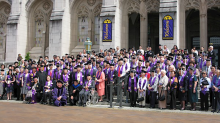On May 18, 2008, the University of Washington bestowed honorary baccalaureate degrees to 449 Japanese American students from the class of 1941- 42 who, due to Executive Order 9066, were banished from the University campus in early May 1942. This long-overdue ceremony, “The Long Journey Home,” was an inflection point for alumnus Allen Shimada.
“The recognition reinforced my pride in being a Husky,” says Shimada (BS, Fisheries, 1978; MMA, Marine Affairs, 1985). “That was when I first thought that one day it would be possible to show my appreciation to the University.”
Today, Shimada is doing just that by establishing the Long Journey Home Challenge — an endowment that will perpetually support the Department of American Ethnic Studies, enabling it to continue expanding its education opportunities, fostering the next generation of influential and informed citizens.
Another connection is Tetsuden Kashima, professor emeritus and longtime friend of Shimada. Kashima arrived at the University of Washington in 1976 as the inaugural director of the Asian American Studies Program, an early area of concentration that contributed to the formation of the Department of American Ethnic Studies in 1985. Kashima was incarcerated as an infant and later as UW faculty was an early advocate for an annual Day of Remembrance, February 19th, marking President Franklin D. Roosevelt’s signing of Executive Order 9066. His passion ultimately culminated in the UW’s “Long Journey Home” celebration in 2008.
“Over time I realized I could honor all of these connections by creating an endowment campaign," says Shimada. "Although this is part of my story, it’s very much interrelated with the UW stories of so many others."
Third-year AES major Elliot Okimoto agrees.
“Going to college can be about gaining professional skills and knowledge, but it can also be about developing yourself as a human,” they say. “The American Ethnic Studies Department helps you gain a critical understanding of the world that is so central to being a human in a society. I feel like I am a more thoughtful and analytical person because I have a better understanding of how the world around me functions.”
As a first-year student, Okimoto took “American Internment and Incarceration: Race, Discrimination, and Power” with Professor Vince Schleitwiler. To get extra credit for the course, they attended the Nikkei Student Union’s (NSU) annual Day of Remembrance in 2020. They remember seeing Tsuru for Solidarity at the event, a group of Japanese American social justice advocates and allies working to end detention sites.
“It highlighted for me that there are Nikkei people out there organizing and advocating, who care very deeply about very important issues and are using their connection to identity to advocate for change that they want to see in the world,” Okimoto says. Okimoto's experiences in the American Ethnic Studies Department and NSU have also helped them connect to their personal identity as Japanese American in a new way.
Read the full article The Long, Interconnected Journey Home | UW College of Arts & Sciences.
Additionally, the Seattle Japanese American Town Hall event will be held on Tuesday, August 19th, 6PM-8PM, and is free and open to the public. Join their community-led town hall to share the lasting impacts of WWII incarceration, and demand our government act now, in ways they never did in 1941, to protect vulnerable communities. Here is additional information about this event Seattle Japanese American Town Hall - Action Network.
